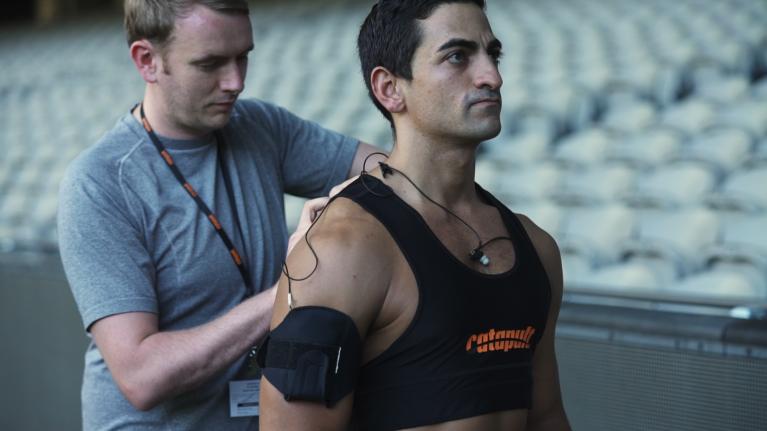Human research at VU
Victoria University is committed to quality research that respects human research participants. All research involving or impacting on humans must be performed in an ethical manner.
We ensure all reasonable steps are taken to implement the National Statement on Ethical Conduct in Human Research.

Values & principles
Human research ethics ensures researchers and research students uphold the values and principles of ethical conduct when designing, conducting and reporting research findings.
There are additional guidelines for research with Aboriginal and Torres Strait Islander people.
Values
All research 'with or about people, or their data or tissue' (National Statement) should reflect the following values:
- Respect for human beings – treat individuals as autonomous agents and respect their privacy, confidentiality and cultural sensitivities. All participants have the right to make informed decisions about matters that affect them. People must be protected and empowered if their capacity to make informed decisions is impaired.
- Research merit and integrity – research must be worthwhile, have justified benefits, and have value to the community. Report findings accurately and responsibly. Use methods, facilities and resources that are appropriate to achieve the research aims. Supervisors must have appropriate expertise.
- Justice – use procedural fairness in the recruitment of participants and review of research, and use 'just' means that do not unfairly burden particular groups. Distribute research findings within a reasonable time and share the benefits of research fairly between participants and the wider community.
- Beneficence – maximise possible benefits and minimise possible harms. Be sensitive to the welfare and interests of participants, and the cultural and social implications of the research. The likely benefits to participants or the wider community must justify any risk of harm or discomfort to research participants.
Principles
Principles help guide researchers to develop and conduct research in a way that is:
- safe
- respectful
- responsible
- high quality.
These principles apply to all research, including:
- surveys, interviews or focus groups
- psychological, physiological or medical testing or treatment
- being observed by researchers
- researchers accessing personal documents or other materials
- collection and use of body organs, tissues, fluids or exhaled breath
- access to information as part of an existing published or unpublished source or database.
Ethical practice legislation
Ethical practice is also underpinned by the National Health and Medical Research Council (NHMRC). The current legislative basis of the Council is the National Health and Medical Research Council Act 1992 (the Act). The Act ascertains that the functions of the Australian Health Ethics Committee are:
- to advise the Council on ethical issues relating to health
- to develop and give the Council guidelines for the conduct of medical research involving humans
- such other functions as the Minister from time to time determines.
The Australian Health Ethics Committee (AHEC) is a principal committee of the NHMRC. The Act sets out AHECs functions, which are to advise NHMRC on ethical issues relating to health and developing guidelines for the conduct of medical research involving humans. The AHECs functions also include the:
- promotion of community debate on health ethics issues
- monitoring of human research ethics committees (HRECs)
- monitoring and advising of international developments in health ethics.
Ethics approval
Victoria University is serviced by the Victoria University Human Research Ethics Committee (VUHREC) and the Low Risk Human Research Ethics Committee (LRHREC), ensuring research projects involving or impacting on humans are conducted ethically.
The HRECs are responsible for ensuring that research projects involving humans adhere to ethical principles and conform to relevant legal requirements.
The primary responsibility of each committee member is to decide whether the welfare and rights of research participants are protected.
The VUHREC meets regularly to review and monitor emerging ethical issues and ensure relevant scholarly and scientific standards are met.
Retrospective ethics approvals cannot be provided, as this would contravene the requirements of the National Statement on Ethical Conduct in Human Research.
Ethics application resources & guides
Human Research Ethics resources
Australian Clinical Trials
Information about clinical trials in Australia for the public, researchers and industry.
Australian Clinical Trial Handbook
A guide to the conduct of clinical trials to International standards of Good Clinical Practice (GCP) in the Australian context.
Australian New Zealand Clinical Trials Registry
Online register of clinical trials being undertaken in Australia and New Zealand.
Department of Justice Working With Children (or WWC) Check
If your research involves regular direct and unsupervised contact with a child or children you may need a Working With Children Check
Ethical conduct in research with Aboriginal and Torres Strait Islander peoples and communities: Guidelines for researchers and stakeholders (2018)
Guidelines to assist researchers in gaining an understanding of differences in values and culture to ensure both the ethics and quality of research is maintained.
Expression of interest in joining the Human Research Ethics Committee
If you're interested in joining the Victoria University Human Research Ethics Committee (VUHREC), please submit an expression of interest.
National Framework of Ethical Principles in Gene Technology 2012
For individuals working with genetically modified organisms, and for Institutional Biosafety and Research Ethics Committees.
National Statement on Ethical Conduct in Human Research (2023)
An essential resource for researchers, designed to clarify the responsibilities of institutions and researchers for the ethical design, conduct and dissemination of results of human research.
Office of the Australian Information Commissioner - Privacy
Provides information on how and when personal information can be collected, how it should be used and disclosed, and storage and security.
Research Involving Irradiation of People
An overview of the regulatory approach to research involving irradiation of persons.

